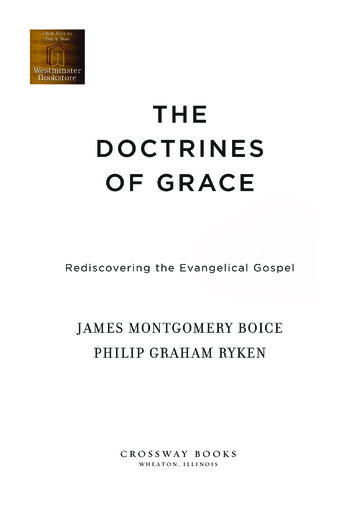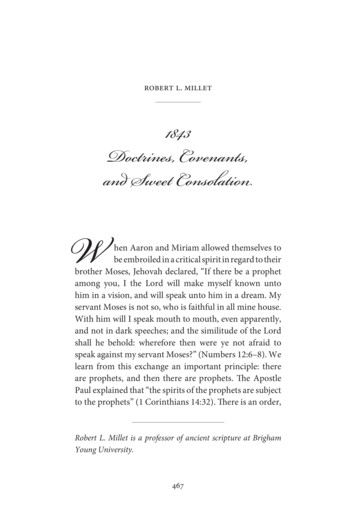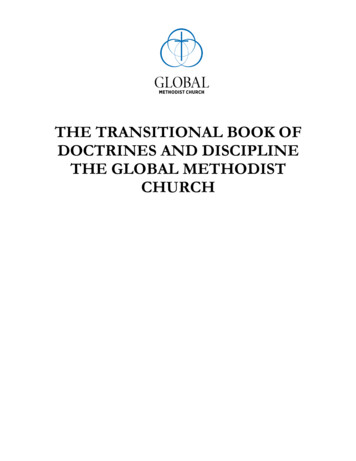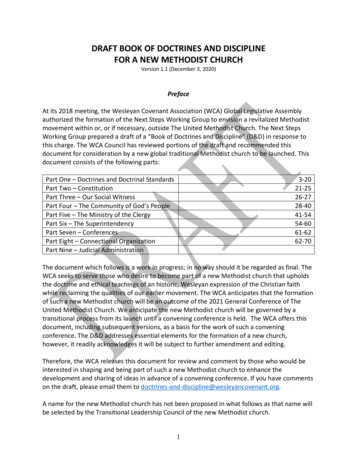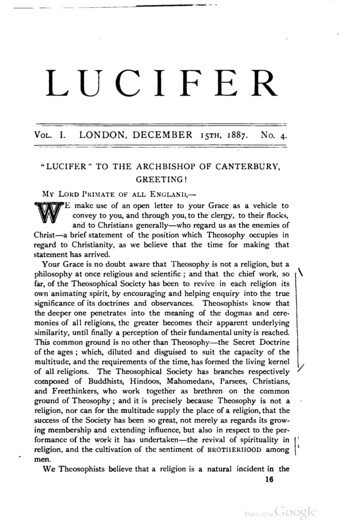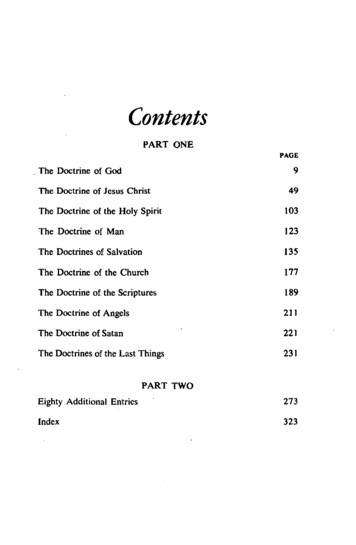
Transcription
ContentsPART ONEPAGE9. The Doctrine of GodThe Doctrine of Jesus Christ49The Doctrine of the Holy Spirit103The Doctrine of Man123The Doctrines of Salvation135The Doctrine of the Church177The Doctrine of the Scriptures189The Doctrine of Angels211The Doctrine of Satan221The Doctrines of the Last Things231PART TWOEighty Additional Entries273Index323
THE DOCTRINE OF GODI. HIS EXISTENCE1. Taken for Granted by the Scripture WritersIt does not seem to have occurred to any of the writers of eitherthe Old or the New Testaments to attempt to prove or to argue forthe existence of God. Everywhere and at all times it is a fact takenfor granted. "A God capable of proof would be no God at all"(Jacobi). He is the self-existent One (Exod. 3: 14) and the Sourceof all life (John 5:26).The sublime opening of the Scriptures announces the fact ofGod and His existence: "In the beginning God" (Gen. I: I). Nor isthe rise or dawn of the idea of God in the mind of man depicted.Psa. 14: I: "The fool hath said in his heart, There is no God,"indicates not a disbelief in the existence, but rather in the activeinterest of God in the affairs of men-He seemed to hide Himselffrom the affairs of men (see Job 22: 12-14).The Scriptures further recognize that men not only know of theexistence of God, but have also a certain circle of ideas as to whoand what He is (Rom. I: 18,19).No one but a "fool" will deny the fact of God. "What! no God?A watch, and no key for it? A watch with a main-spring broken,and no jeweler to fix it? A watch, and no repair shop? A timecardand a train, and nobody to run it? A lamp lit, and nobody to pouroil in to keep the wick burning? A garden, and no gardener?Flowers, and no florist? Conditions, and no conditioner?" Hethat sitteth in the heavens shall laugh at such absurd atheism.2. The Arguments for the Existence of God*These arguments may not prove conclusively that God is, butthey do show that in order to argue for the existence of any knowledge, thought, reason, conscience in man, we must assume that Godis (Strong). It is said of the beautiful, . It may be shown, but not A fuller and complete presentation of these arguments for the existenceof God may be found in the works of Dr. Augustus H. Strong and Dr. Francis L. Patton, to whom the author is here indebted.13
14THE GREAT DOCTRINES OF THE BIBLEproved." So we say of the existence of God. These arguments areprobable, not demonstrative. For this reason they supplement eachother, and constitute a series of evidences which is cumulative in itsnature. Though taken singly, none of them can be consideredabsolutely decisive, they together furnish a corroboration of ourprimitive conviction of God's existence, which is of great practicalvalue, and is in itself sufficient to bind the moral actions of men.A bundle of rods may not be broken even though each one separately may; the strength of the bundle is the strength of the whole.If in practical affairs we were to hesitate to act until we have absolute and demonstrable certainty, we should never begin tomove at all.Instead of doubting everything that can be doubted, let us ratherdoubt nothing until we are compelled to doubt.The late Dr. Orr said: "What we mean by the proof of God'sexistence is simply that there are necessary acts of thought bywhich we rise from the finite to the infinite, from the caused to theuncaused, from the contingent to the necessary, from the reasoninvolved in the structure of the universe to a universal and eternalreason, which is the ground of all, from morality in conscience to amoral Lawgiver and Judge. In this connection the theoreticalproofs constitute an inseparable unity-'constitute together,' as Dr.Stirling declares, 'but the undulations of a single wave, which waveis but.a natural rise and ascent to God, on the part of man's ownthought, with man's own experience and consciousness as the object before him.' "Religion was not produced by proofs of God's existence, and willnot be destroyed by its insufficiency to some minds. Religionexisted before argument; in fact, it is the preciousness of religionthat leads to the seeking for all possible confirmations of thereality of God.a) UNIVERSALITY OF BELIEF IN THE EXISTENCE OFGOD( I) THE FACT STATED AND PROVEN:Man everywhere believes in the existence of a supreme Being orbeings to whom he is morally responsible and to whom propitiationneeds to be made.Such belief may be crudely, even grotesquely stated and manifested, but the reality of the fact is no more invalidated by suchcrudeness than the existence of a father is invalidated by thecrude attempts of a child to draw a picture of its father.
THE DOCTRINE OF GOD15It has been claimed by some that there are or were tribes ininland Africa that possessed no idea or conception of God. Moffat, Livingstone's father-in-law, made such a claim, but Livingstone, after a thorough study of the customs and languages of suchtribes, conclusively showed that Moffat was wrong.Nor should the existence of such few tribes, even if granted,violate the fact we are here considering, any more than the existence of some few men who are blind, lame, deaf, and dumb wouldmake untrue the statement and fact that man is a seeing, hearing, speaking, and walking creature. The fact that some nationsdo not have the multiplication table does no violence to arithmetic.Concerning so-called atheists in Christian lands: it may be questioned if there are really any such beings. Hume, known as afamous skeptic, is reported to have said to Ferguson, as togetherthey looked up into the starry sky: "Adam, there is a God." Voltaire, the atheist, prayed to God in a thunderstorm. Ingersoll,when charged with being an atheist, indignantly refuted the charge,saying: "I am not an atheist; I do not say that there is no God; I aman agnostic; I do not know that there is a God." "I thank God thatI 3m an atheist," were the opening words of an argument to disprove the existence of God. A new convert to atheism was onceheard to say to a coterie of unbelievers: "I have gotten rid of theidea of a supreme Being, and I thank God for it."(2) WHENCE COMES THIS UNIVERSAL BELIEF IN THE EXISTENCE OF GOD?Not from outside sources, such as reason, tradition, oreven the ScripturesNot from reason or argument, for many who believe in Godhave not given any time to reasoning and arguing the question;some, indeed, intellectually, could not. Others who have greatpowers of intellect, and who have reasoned and argued on the subject are professed disbelievers in God. Belief in God is not theresult of logical arguments, else the Bible would have given usproofs.Nor did this universal belief come from tradition, for "Tradition," says Dr. Patton, "can perpetuate only what has been originated."Nor can it be said that this belief came from the Scriptures even,for, as has been well said, unless a man had a knowledge of theGod from whom the Scriptures came, the revelation itself couldhave no authority for him. The very idea of Scripture as a revelaaa)
16THE GREAT DOCTRINES OF THE BIBLEtion presupposes belief in a God who can make it.-NewmanSmith. Revelation must assume the existence of God.bb) This universal belief comes from within man.All the evidence points to the conclusive fact that this universalfaith in the existence of God is innate in man, and comes fromrational intuition.(3) THE WEIGHT AND FORCE OF THIS ARGUMENTThe fact that all men everywhere believe in the existence of asupreme Being or beings to whom they are morally responsible, isa strong argument in favor of its truth. So universal an effect musthave a cause as universal, otherwise we have an effect without anyassignable cause. Certain is it that this argument makes the burdenof proof to rest upon those who deny the existence of God.b) THE ARGUMENT FROM CAUSE: COSMOLOGICALWhen we see a thing we naturally ask for the cause of that thing.We see this world in which we live, and ask how it came to be. Isit self-originating, or is the cause of its being outside of itself? Isits cause finite or infinite?That it could not come into being of itself seems obvious; nomore than nails, brick, mortar, wood, paints, colors,. form into ahouse or building of themselves; no more than the type composinga book came into order of itself. When Liebig was asked if he believed that the grass and flowers which he saw around him grewby mere chemical forces, he replied: "No; no more than I couldbelieve that the books on botany describing them could grow bymere chemical forces." No theory of an "eternal series" can account for this created universe. No matter how long a chain youmay have, you must have a staple somewhere from which it depends. An endless perpendicular chain is an impossibility. "Everyhouse is builded by some man," says the Bible; so this world inwhich we live was built by a designing mind of infinite power andwisdom.So is it when we consider man. Man exists; but he owes hisexistence to some cause. Is this cause within or without himself,finite or infinite? Trace our origin back, if you will, to our firstparent, Adam; then you must ask, How did he come into being?The doctrine of the eternity of man cannot be supported. Man isan effect; he has not always existed. Geology proves this. That thefirst Cause must have been an intelligent Being is proven by thefact that we are intelligent beings ourselves.
THE DOCTRINE OF GOD17c) THE ARGUMENT FROM DESIGN: TELEOLOGICALA watch proves not only a maker, an artificer, but also a designer; a watch is made for a purpose. This is evident in itsstructure. A thoughtful, designing mind was back of the watch.So is it with the world in which we live. These "ends" in natureare not to be attributed to "natural resuIts," or "natural selection,"results which are produced without intelligence, nor are they"the survival of the fittest," instan'ces in which "accident and fortuity have done the work of mind." No, they are the results of asuperintending and originating intelligence and will.d) THE ARGUMENT FROM BEING: ONTOLOGICALMan has an idea of an infinite and perfect Being. From whencethis idea? From finite and imperfect beings like ourselves? Certainly not. Therefore this idea argues for the existence of aninfinite and perfect Being: such a Being must exist, as a person,and not a mere thought.e) THE MORAL ARGUMENT: ANTHROPOLOGICALMan has an intellectual and a moral nature, hence his Creatormust be an intellectual and moral Being, a Judge, and Lawgiver.Man has an emotional nature; only a Being of goodness, power,love, wisdom and holiness could satisfy such a nature, and thesethings denote the existence of a personal God.Conscience in man says: "Thou shalt," and "Thou shalt not,""I ought," and "I ought not." These mandates are not self-imposed.They imply the existence of a Moral Governor to whom we areresponsible. Conscience-there it is in the breast of man, an idealMoses thundering from an invisible Sinai the Law of a holy Judge.Said Cardinal Newman: "Were it not for the voice speaking soclearly in my conscience and my heart, I should be an atheist, or apantheist, when I looked into the world." Some thirigs are wrong,others right: love is right, hatred is wrong. Nor is a thing right because it pleases, or wrong because it displeases. Where did weget this standard of right and wrong? Morality is obligatory, notoptional. Who made it obligatory? Who has a right to commandmy life? We must believe that there is a God, or believe that thevery root of our nature is a lie.f) THE ARGUMENT FROM CONGRUITYIf we have a key which fits all the wards of the lock, we knowthat it is the right key. If we have a theory which fits all the facts
18THE GREAT DOCTRINES OF THE BIBLEin the case, we know then that we have the right theory. "Beliefin a self-existent, personal God is in harmony with all the facts ofour mental and moral nature, as well as with all the phenomena ofthe natural world. If God exists, a universal belief in his existenceis natural enough; the irresistible impulse to ask for a first causeis accounted for; our religious nature has an object; the uniformityof natural law finds an adequate explanation, and human historyis vindicated from the charge of being a vast imposture. Atheismleaves all these matters without an explanation, and makes, nothistory alone, but our moral and intellectual nature itself, animposture and a lie."-Patton.g) THE ARGUMENT FROM SCRIPTUREA great deal of our knowledge rests upon the testimony of others. Now the Bible is competent testimony. If the testimony oftravelers is enough to satisfy us as to the habits, customs, andmanners of the peoples of the countries they visit, and which wehave never seen, why is not the Bible, if it is authentic history,enough to satisfy us with its evidence as to the existence of God?Some facts need more evidence than others, we know. This istrue of the fact of the existence of God. But the Bible history issufficient to satisfy every reasonable demand. The history of theJews, prophecy, is not explainable minus God. If we cannot believe in the existence of God on the testimony of the Bible wemight as well burn our books of history. A man cannot deny thetruth of the testimony of the Bible unless he says plainly: "Noamount of testimony will convince me of the supernatural."Scripture does not attempt to prove the existence of God; itasserts, assumes, and declares that the knowledge of God is universal, Rom. I: 19-21, 28, 32; 2: 15. It asserts that God haswrought this great truth in the very warp and woof of every man'sbeing, so that nowhere is He without this witness. The preachermay, therefore, safely follow the example of the Scripture in assuming that there is a God. Indeed he must unhesitatingly and explicitly assert it as the Scripture does, believing that "His eternalpower and divinity" are things that are clearly seen and perceivedthrough the evidences of His handiwork which abound on everyhand.II. THE NATURE OF GOD (Vs. Agnosticism)1. The Spirituality of God (Vs. Materialism)"God Is Spirit."
THE DOCTRINE OF GOD19a) STATEMENT OF THE FACT, JOHN 4:24: "GOD ISSPIRIT."Meaning: The Samaritan woman's question, "Where is God tobe found?" etc. On Mt. Zion or Gerizim? Christ's answer: Godis not to be confined to anyone place (cf. Acts 7:48; 17:25; IKings 8: 27). God must be worshipped in spirit as distinguishedfrom place, form, or other sensual limitations (John 4:21); and intrlllh as distinguished from false conceptions resulting from imperfect knowledge (4: 22).b) LIGHT ON "GOD IS SPIRIT," FROM OTHER SCRIPTURESLuke 24:39: "A spirit hath not flesh and bones," i. e., has notbody, or parts like human beings; incorporeal; not subject tohuman limitations.Col. I: 15: "The image of the invisible God."I Tim. I: 17 (R. V.): "Now unto the King incorruptible, invisible,"These passages teach that God has nothing of a material orbodily nature. Sight sees only objects of the material world, butGod is not of the nature of the material world, hence He cannotbe seen with the material eye-at least not now.c) LIGHT DERIVED FROM CAUTIONS AGAINST REPRESENTING GOD BY GRAVEN IMAGESDeut. 4: 15-23; Isa. 40:25; Exod. 20:4. Study these passagescarefully and note that the reason why images were forbiddenwas because no one had ever seen God, and consequently couldnot picture how He looked, and, further, there was nothing on theearth that could resemble Him.d) DEFINITION OF "GOD IS SPIRIT" IN THE LIGHTOF ALL THISGod is invisible, incorporeal, without parts, without body, without passions, and therefore free from all limitations; He is apprehended not by the senses, but by the soul; hence God is abovesensuous perceptions. I Cor. 2:6-16 intimates that without theteaching of God's Spirit we cannot know God. He is not a material Being. "LaPlace swept the heavens with his telescope, butcould not find anywhere a God. He might just as well haveswept a kitchen with his broom." Since God is not a material Being, He cannot be apprehended by physical means.
20THE GREAT DOCTRINES OF THE BIBLEe) QUESTIONS AND PROBLEMS WITH REFERENCE TOTHE STATEMENT THAT "GOD IS SPIRIT."(I) WHAT Is MEANT By STATEMENT THAT MANMADE "IN THE IMAGE OF GOD"?WASCol. 3: 10; Eph. 4: 24 declare that this "image" consists in"righteousness, knowledge, and holiness of truth." By that ismeant that the image of God in man consisted in intellectual andmoral likeness rather than physical resemblance. Some think that1 Thess. 5:23 indicates that the "trinity of man"-body, soul, andspirit-constitutes that image and likeness.(2) WHAT Is MEANT By THE ANTHROPOMORPHIC EXPRESSIONS USED OF GOD?For example: God is said to have hands, feet, arms, eyes, ears;He sees, feels, hears, walks, etc. Such expressions are to be understood only in the sense of being human expressions used in orderto bring the infinite within the comprehension of the finite. Howotherwise could we understand God saving by means of humanexpressions, in figures that we all can understand!(3) How ARE SUCH PASSAGES As EXOD. 24:10 AND 33:1823, IN WHICH IT Is DISTINCTLY STATED THAT MEN SAWTHE GOD OF ISRAEL, To BE RECONCILED WITH SUCHPASSAGES As JOHN 1:18: "No MAN HATH SEEN GOD ATANY TIME," AND EXOD. 33:20: "THERE SHALL No MANSEE ME AND LIVE"? ANSWER:aa) Spirit can be manifested in visible form:John 1 :32: "I saw the Spirit descending from heaven like a,dove lor in the form of a dove I." SO throughout the ages theinvisible God has manifested Himself in visible form. (See Judges6: 34: The Spirit of the Lord clothed Himself with Gideon.)bb) On this truth is based the doctrine of "The Angel of theLord"in the Old Testament: Gen. 16:7, 10, 13. Note here how theAngel of the Lord is identified with Jehovah Himself, d. vv. 10,13. Also Gen. 22: 12-"The angel of the Lord . . . not withheld from me." In 18: 1-16, one of the three angels clearly anddefinitely identifies himself with Jehovah. Compare chapter 19,where it is seen that only two of the angels have come to Sodom;the other has remained behind. Who was this one, this remaining
THE DOCTRINE OF GOD21angel? Gen. 18:17,20 answers the question; v. 22 reads: "AndAbraham stood yet before the LORD." In Exod. 13:21 it is Jehovah,while in 14: 19 it is the Angel that went before Israel. Thus wasthe way prepared for the incarnation, for the Angel of the Lord inthe Old Testament is undoubtedly the second person of theTrinity. This seems evident from Judges 13: 18 compared with Isa.9: 6, in both of which passages, clearly referring to Christ, thename "Wonderful" occurs. Also the omission of the definite article"the" from before the expression "Angel of the Lord," and the substitution of "an" points to the same truth. This change is made inthe Revised Version.ce) What was it then that the elders of Israel saw when it issaid they "saw the God of Israel"?Certainly it was not God in His real essence, God as He is inHimself, for no man can have that vision and live. John I: 18 isclear on that point: "No man hath seen God at any time." Th emphasis in this verse is on the word "God," and may read,"GOD no one has seen at any time." In 5:37 Jesus says: "Ye haveneither heard his voice at any time, nor seen his shape." Fromthis it seems clear that the "seeing" here, the which has been theprivilege of no man, refers to the essence rather than to the personof God, if such a distinction can really be made. This is apparentalso from the omission of the definite article before God, as well asfrom the position of God in the sentence. None but the Son hasreally seen God as God, as He really is. What, then, did thesemen see?Evidently an appearance of God in some form io their outwardsenses; perhaps the form of a man, seeing mention is made of his"feet." The vision may have been too bright for human eyes togaze upon fully, but it was a vision of God. Yet it was only amanifestation of God, for, although Moses was conversing withGod, he yet said:' "If I have found grace in thy sight, show me thyface." Moses had been granted exceeding great and preciousprivileges in that he had been admitted into close communionwith God, more so than any other member of the human race.But still unsatisfied he longed for more; so in v. 18 he asks to seethe unveiled glory of God, that very thing which no man in theflesh can ever see and live; but, no, this cannot be. By referringto Exod. 33: 18-23 we find God's. answer: "Thou canst not seemy face . . . thou shalt see my back parts, but my face shall
22THE GREAT DOCTRINES OF THE BIBLEnot be seen." (Num. 12:8 throws light upon the subject, if compared with Exod. 33: 11.)"The secret remained unseen; the longing unsatisfied; and thenearest approach to the beatific vision reached by him with whomGod spake face to face, as friend with friend, was to be hidden inthe cleft of the rock, to be made aware of an awful shadow, andto hear the voice of the unseen."2. The Personality of God (Vs. Pantheism)Pantheism maintains that this universe in its ever changing conditions is but the manifestation of the one ever changing universalsubstance which is God; thus all, everything is God, and God iseverything; God is all, all is God. Thus God is identified withnature and not held to be independent of and separate from it.God is, therefore, a necessary but an unconscious force working inthe world.The Bearing of the Personality of God on the Idea of Religion.True religion may be defined as the communion between twopersons: God and man. Religion is a personal relationship between God in heaven, and man on the earth. If God were not aperson there could be no communion; if both God and man wereone there could be no communion, and, consequently, no religion. An independent personal relationship on both sides is absolutely necessary to communion. Man can have no communionwith an influence, a force, an impersonal something; nor can aninfluence have any moving or affection towards man. It is absolutely necessary to the true definition of religion that both God andman be persons. God is person, not force or influence.a) DEFINITION OF PERSONALITYPersonality exists where there is intelligence, mind, will, reason,individuality, self-consciousness, and self-determination. Theremust be not mere consciousness-for the beast has that-but selfconsciousness. Nor is personality determination-for the beast hasthis, too, even though this determination be the result of influencesfrom without-but self-determination, the power by which manfrom an act of his own free will determines his acts from within.Neither corporeity nor substance, as we understand these words,are necessarily, if at all, involved in personality. There may betrue personality without either or both of these.
THE DOCTRINE OF GOD23b) SCRIPTlJRE TEACHING ON THE PERSONALITY OFGOD( In this connection it will be well to refer to the OntologicalArgument for the Exislence of God, for which see p. 17.j(I) EXOD. 3: 14:-"1 AM THAT I AM."This name is wonderfully significant. Its central idea is that ofexistence and personality. The words signify "I AM, I WAS, ISHALL BE," so suggeslively corresponding with the New Testament statement concerning God: "Who wast, and art, and art tocome."All the names given to God in the Scripture denote personality.Here are some of them:Jehovah-Jireh: The Lord will provide (Gen. 22: 13, 14).Jehovah-Rapha: The Lord that healeth (Exod. 15:26).Jehovah-Nissi: The Lord our Banner (Exod. 17:8-15).Jehovah-Shalom: The Lord our Peace (Judges 6:24).Jehovah-Ra-ah: The Lord my Shepherd (Psa. 23: I).Jehovah-Tsidkenu: The Lord our Righteousness (ler. 23:6).Jehovah-Shammah: The Lord is present (Ezek. 48: 35).Moreover, the personal pronouns ascribed to God prove personality: John 17:3, et al. "To know thee"-we cannot know aninfluence in the sense in which the word "know" is here used.Statement: All through the Scriptures names and personal pronouns are ascribed ·to God which undeniably prove that God is aPerson.(2) A SHARP DISTINCTION Is DRAWN IN THE SCRIPTURES BETWEEN THE GODS OF THE HEATHEN AND THE LoRDGOD OF ISRAEL (SEE JER. 10: 10-16).Note the context: vv. 3-9: Idols are things, not persons; theycannot walk, speak, do good or evil. God is wiser than the menwho made Ihese idols; if the idol-makers are persons, muchmOTe is God.See the sharp contrast drawn between dead idols and the living,personal, true and only God: Acts 14: 15; I Thess. 1 :9; Psa.94:9, 10.Statement: God is to be clearly distinguished from things whichhave no life; he is a living Person.(3) ATTRIBUTES OF PERSONALITY ARE ASCRIBED To GOD INTHE SCRIPTURES.
24THE GREAT DOCTRINES OF THE BIBLEGod repents (Gen. 6:6); grieves (Gen. 6:6); is angry (1 Kings11:9); is jealous (Deut. 6:15); loves (Rev. 3:19); hates (Prov.6: 16).Statement: God possesses the attributes of personality, andtherefore is a Person.(4) THE RELATION WHICH GOD BEARS To THE UNIVERSEAND To MEN, As SET FORTH IN THE SCRIPTURES, CANBE EXPLAINED ONLY ON THE BASIS THAT GOD Is APERSON.Deism maintains that God, while the Creator of the world, yetsustains no further relations to it. He made it just as the c1ockmaker makes a self -winding clock: makes it and then leaves itto run itself without any interference on his part. Such teachingas this finds no sanction in the Bible. What are God's relations tothe universe and to men?aa) He is the Creator of the Universe and Man.Gen. I: I, 26; John 1: 1-3. These verses contain vital truths.The universe did not exist from eternity, nor was it made fromexisting matter. I t did not proceed as an emanation from theinfinite, but was summoned into being by the decree of God.Science, by disclosing to us the marvellous power and accuracy ofnatural law, compels us to believe in a superintending intelligence who is infinite. Tyndall said: "I have noticed that it is notduring the hours of my clearness and vigor that the doctrine ofmaterial atheism commends itself to my mind."(In 'this connection the Arguments from Cause and Design,pp. 16 and 17, may be properly considered.)Statement: The creation of the universe and man proves the personality of the Creator-God.bb) God sustains certain relations to the Universe and Manwhich He has made.Heb. I :3-"Upholds all things." Col. I: 15-17-"By him allthings hold together." Psa. 104:27-30-AIl creatures wait uponHim for "their meat in due season." Psa. 75:6, 7-"Promotion"among men, the putting down of one man and the setting up ofanother, is from the hand of God.What do we learn from these scriptures regarding the relationof God to this universe, to man, and to all God's creatures?First. That all things are held together by Him; if not, this old
THE DOCTRINE OF GOD25world would go to pieces quickly. The uniformity and accuracy ofnatural law compels us to believe in a personal God who intelligently guides and governs the universe. Disbelief in this factwould mean utter confusion. Not blind chance, but a personalGod is at the helm.Second. That the physical supplies for all God's creatures are inHis hand: He feeds them all. What God gives we gather. If Hewithholds provision we die.Third. That God has His hand in history, guiding and shapingthe affairs of nations. Victor Hugo said: "Waterloo was God."Fourth. Consider with what detail God's care is described: Thesparrows, the lilies, the hairs of the head, the tears of His children,etc. See how these facts are clearly portrayed in the followingscriptures: Matt. 6:28-30; 10:29, 30; Gen. 39:21, with 50:20;D3n. 1:9;Job 1:12.Statement: The personality of God is shown by His activeinterest and participation in all things, even the smallest things,in the universe, the experience of man, and in the life of all Hiscreatures.3. The Unity of God (Vs. Polytheism)There are Ihree monotheistic religions in the world: Judaism,Christianity, and Muhammadanism. The second is a developmentof the first; the third is an outgrowth of both.The doctrine of the unity of God is held in contradistinctionto Polytheism, which is belief in a multiplicity of gods; to Tritheism, which teaches that there are three Gods-that is, that theFather, the Son, and the Holy Ghost are, specifically, three distinctGods; and to Dualism, which teaches that there are two indepenent divine beings or eternal principles, the one good, and theother evil, a set forth especially in Gnostic systems, such asParseeism.a) THE SCRIPTURES ASSERT THE UNITY OF GOD.Deut. 6:4-"Hear, 0 Israel; the Lord our God is one Lord"; or,"The Lord our God,' the Lord is one." Isa. 44:6-8-"First . . .last . . . beside me there is no God." Isa. 45 :5-"There isnone else, there is no God beside me." I Tim. 2:5-"There is oneGod." I Cor. 8:4-"There is none other God but one."That God is one, that there is no other, that He has no equal isthe forceful testimony of above fifty passages in the Scriptures.The fundamental duty of life, namely, the devotion of the entire
26THE GREAT DOCTRINES OF THE BIBLEbeing to the Lord, is based upon the unity of God: "The Lord. . . . is one . . . . therefore thou shalt love the Lord thy Godwith all thy heart," etc.No other truth of the Scripture, particularly of the Old Testament, receives more prominence than that of the unity of God.This truth is clearly pronounced also in the material universe; itis the introduction and conclusion of all scientific researches. Anyother representation contradicts both creation and revelation. Itsdenial is a proper object for the ridicule of every thinking man,and of the disbelief of every orthodox Christian. Let this, then,be our first and necessary conclusion-that Deity, whether creating, inspiring, or otherwise manifesting itself, is one God; one,and no more.-Cerdo.A multiplication of gods is a contradiction; there can be butone God. There can be but one absolutely perfect, supreme, andalmighty Being. Such a Being cannot be multiplied, nor pluralized.There can be but one ultimate, but one all-inclusive, but one God.Monotheism, then, not Tri-theism, is the doctrine set forth inthe Scriptures. "If the thought that wishes to be orthodox h
14 THE GREAT DOCTRINES OF THE BIBLE proved." So we say of the existence of God. These arguments are probable, not demonstrative. For this reason they supplement each other, and constitute a series of evidences which is cumulative in its . I 3m an atheist
